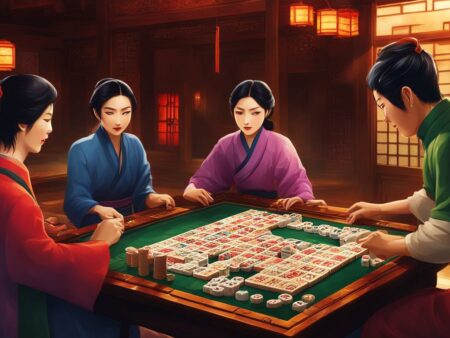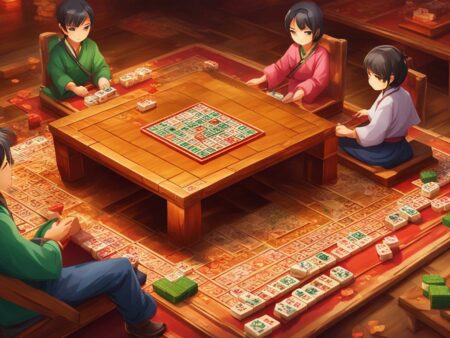Welcome to my guide to the official mahjong tournament rules! Whether you’re a seasoned player or new to tournament play, understanding the rules and regulations is essential for success. In this guide, we will delve into the intricacies of mahjong tournament play and explore the strategies and skills needed to excel. Let’s get started!
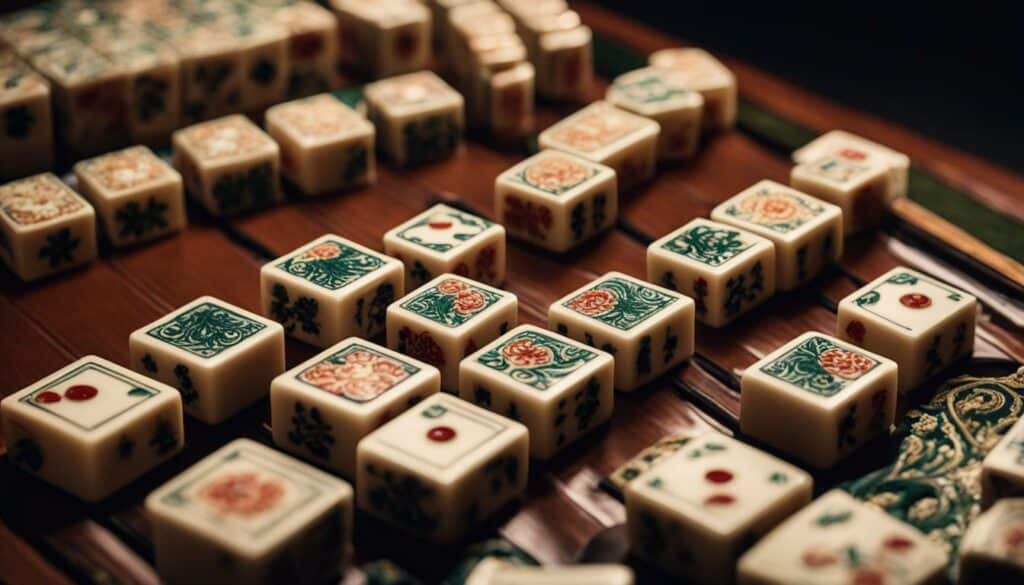
First, let’s talk about the official mahjong tournament rules. These rules are followed in all professional and international mahjong tournaments and are essential for any competitive player to understand. This guide will provide an overview of these rules and how to navigate them to become a successful tournament player.
So, whether you’re a seasoned pro or a beginner just starting, we’ve got you covered. Let’s jump in and start exploring the world of mahjong tournament play, starting with the basics in the next section.
Understanding the Basics
Before diving into mahjong tournament rules, it’s crucial to have a solid understanding of the standard mahjong rules that apply to tournament settings. Mahjong is a four-player game that involves skill, strategy, and luck. The objective is to create a winning hand consisting of 14 tiles comprising four sets and a pair.
Each set can be either a pung (three identical tiles), a chow (three consecutive tiles of the same suit), or a kong (four identical tiles). The pair is made up of two identical tiles. The game is played with a total of 144 tiles, split between bamboo, characters, and dots. The game also includes honor tiles and bonus tiles to earn extra points.
At the start of the game, players must take turns drawing and discarding tiles from the wall. The first player to create a winning hand wins the round, and the game continues for a predetermined number of rounds. Scoring is based on a combination of the value of the winning hand, bonus points, and penalties for specific actions, such as exposing tiles or declaring a false win.
Mahjong Rules for Tournaments
In tournament play, the basic rules of mahjong remain the same, but additional regulations are implemented to ensure fair and competitive gameplay. Some of the standard mahjong tournament rules include:
- Playing with a specific set of tiles and table layout
- Strict time limits for making moves
- Prohibiting communication between players
- Penalties for breaking rules or displaying unsportsmanlike behavior
Understanding the standard mahjong rules and these additional regulations is essential for any player looking to compete in a mahjong tournament.
“Mahjong is a game that takes minutes to learn but a lifetime to master.” – anonymous
Next, we’ll explore the different tournament formats and structures you may encounter in competitive play.
Tournament Formats and Structures
Competitive mahjong comes in a wide range of tournament formats and structures, each with its specific regulations and rules. It’s crucial to understand the different tournament formats available for mahjong players looking to compete at a professional or international level.
Round-Robin Tournaments
A round-robin tournament is a competitive format typically used for smaller mahjong tournaments. In this format, players compete against every other player in the tournament, scoring based on the number of hands won and lost. The player with the highest score at the end of the tournament is declared the winner. Round-robin tournaments are an excellent way for players to gain tournament experience and play against various opponents.
Swiss System Tournaments
Swiss system tournaments involve a fixed number of rounds with pairing based on players’ scores, whereby players with similar records are matched against each other. Players may play against each other once or twice, leading to additional matches in the case of ties. Swiss tournaments are ideal for mid-sized to larger tournaments with many players.
Knockout Tournaments
Knockout tournaments are the most commonly used competitive format in larger mahjong tournaments. In this format, players compete in single-elimination matches until only one player remains. This format is particularly popular in international mahjong tournaments, with players competing in heats until reaching the final stage of the competition. Knockout tournaments favor more experienced players and require high skill and strategic thinking to succeed.
Regulations and Rules
Regulations for mahjong tournaments vary depending on the location and event organizer. However, specific rules are usually set in place to ensure fair play and prevent cheating. Some standard regulations and rules in tournament play include:
- Prohibiting the use of electronic devices during play
- Requires players to follow a specific etiquette and code of conduct
- Limiting the amount of time a player can take to make a move
- Establishing a fixed number of rounds and hands-played
- Setting particular criteria for advancing to the next round, if applicable
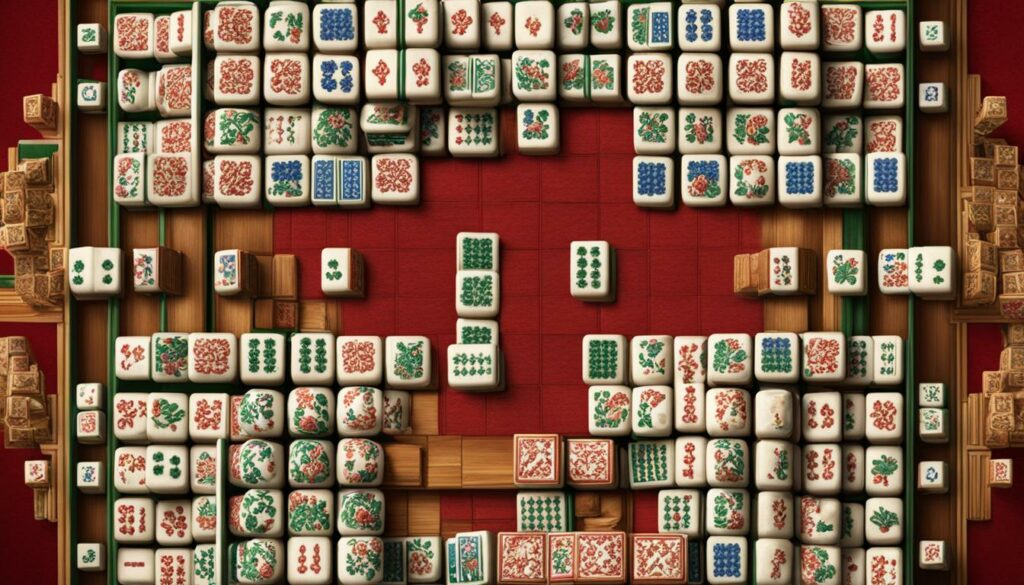
By understanding the different mahjong tournament formats, regulations, and rules, players can better prepare themselves for competitive play and increase their chances of success. Whether you prefer round-robin or knockout tournaments, the key to winning lies in mastering the strategies and tactics unique to tournament play, as we’ll explore more in the next section.
Strategies and Tactics for Tournament Play
As mentioned earlier, mastering the basic rules is the starting point of a successful mahjong tournament performance. This section will cover some advanced gameplay techniques that can give you a competitive edge.
Adapting to Opponents
One of the most critical skills in mahjong tournaments is adapting to different opponents. Please pay attention to their playing styles and adjust your strategy accordingly. For example, if your opponent plays defensively, you may want to take a more aggressive approach to maximize scoring opportunities.
Maximizing Scoring Opportunities
Every point counts in tournament play, and taking advantage of every scoring opportunity is essential. One tactic to increase your chances of scoring is to keep a flexible hand. Avoid committing to a single strategy too early in the game, and be willing to adapt to changing game conditions.
Improving Decision-making Skills
Quick and effective decision-making skills are crucial in the fast-paced environment of a mahjong tournament. Practice analyzing the game board and calculating potential outcomes quickly. Don’t rush, but don’t hesitate to make a move when you see a favorable play. The more you play, the more you’ll develop your instincts and intuition.
Example Tournament Table
| Player | Score | Rank |
|---|---|---|
| John | 65,000 | 1st |
| Sarah | 52,000 | 2nd |
| Emily | 45,000 | 3rd |
| Alex | 39,000 | 4th |
As you can see from the example table above, scoring can vary dramatically in a mahjong tournament. Pay attention to your opponents’ scores and adjust your strategy accordingly. Don’t be afraid to take risks if you need to catch up, but also be mindful of playing defensively if you’re in the lead.
By implementing these strategies and tactics, you’ll be well on your way to becoming a mahjong tournament champion. Remember to stay focused, stay adaptable, and, most importantly, have fun!
The Role of Etiquette and Sportsmanship
As a professional mahjong player, I know that understanding and following proper etiquette and sportsmanship is just as important as mastering the game itself. In fact, in many international mahjong tournaments, points are often awarded based on behavior, demeanor, and gameplay.
One of the most fundamental aspects of proper etiquette is always respecting your opponents, both on and off the table. This means refraining from any behavior that could be seen as mocking, derisive, or aggressive. It’s also important to be gracious in both victory and defeat, congratulating your opponent when they win and accepting defeat with humility. Remember, a true champion is skilled and respectful to others.
Another critical aspect of sportsmanship is upholding fair play. Cheating or manipulating the game in any way is unacceptable and goes against the spirit of competition. Additionally, it’s important to maintain a positive attitude throughout the tournament, even if things don’t go your way. This means avoiding any outbursts of anger or frustration and refraining from negative comments or actions towards other players.
Overall, following proper etiquette and sportsmanship enhances the competitive nature of mahjong tournaments and fosters a sense of community and camaraderie among players. It’s important to remember that while tournaments can be highly intense and competitive, they ultimately celebrate the game we all love.
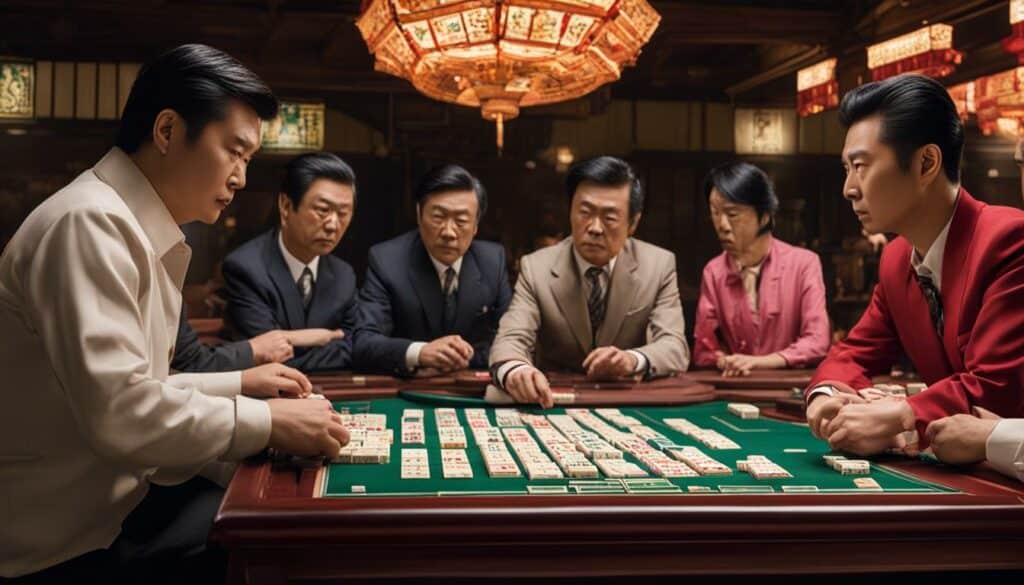
Conclusion
As I wrap up this mahjong tournament rules guide, I hope you have gained valuable insights into the game’s intricacies and mechanics. Remember, to succeed in a mahjong tournament, preparation is key. By familiarizing yourself with the official rules and regulations, practicing effective strategies and tactics, and embodying good sportsmanship, you’ll be well-prepared to take on any opponent.
Always remember that mahjong is not just a game of skill; it’s a game of mental agility, patience, and perseverance. So, if you’re a beginner or a seasoned player, don’t be afraid to challenge yourself and continuously hone your skills. With enough practice and dedication, you can become a mahjong tournament champion!
Lastly, I encourage you to participate in mahjong tournaments whenever you have the chance. It’s a thrilling and rewarding experience that will push your abilities and enable you to meet like-minded individuals who share your passion. So, grab your tiles, mark your calendars, and let the mahjong games begin!
Thank you for reading!
Remember, whether you’re playing for fun or competing professionally, mahjong is a game that can bring people together and foster friendly competition. So, don’t be afraid to immerse yourself in the world of mahjong and discover all that it has to offer. I wish you good luck in all your mahjong endeavors!



